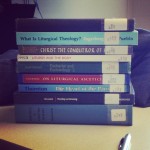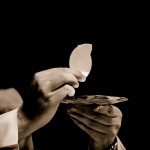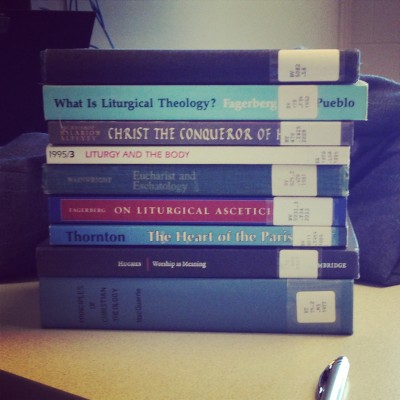If you’re new to my Sermon Notes, you can read about why I prepare them here. They aren’t just for preachers, they’re for everyone!
Thesis
Three concepts really leapt out at me from the collect and lessons this week: holiness, “increase and multiply,” and living lives of self-offering. The combination of 2 Kings and John 6 for the 9th Sunday after Pentecost allows us to delve into the meaning and nature of oblation even if we stop short of a sacramental approach. My thesis here is quite simple and I attribute the quote to Stosh Walsh (my soccer coach at TIU), “bring your gifts to the altar so that all may benefit.” When we bring our lives and gifts to the altar our Great God is good to make those gifts holy and to increase and multiply them to his glory and for the life of the world.
Analysis
Collect
O God, the protector of all who trust in you, without whom nothing is strong, nothing is holy: Increase and multiply upon us your mercy; that, with you as our ruler and guide, we may so pass through things temporal, that we lose not the things eternal; through Jesus Christ our Lord, who lives and reigns with you and the Holy Spirit, one God, for ever and ever. Amen.
I always like to pick the Collect apart for individual thoughts before lining it up next to the lessons. This Collect really grabbed me with beautifully poignant phrases:
Protector of all who trust in you
Without whom nothing is strong, nothing is holy
Increase and multiply upon us your mercy
You as our ruler and guide
We may so pass through things temporal, that we lose not the things eternal
Some of these phrases have quite obvious meanings that do not require further comment; that God is protector, ruler, and guide is pretty straightforward. However, other phrases really beg for some attention.
Without whom nothing is strong, nothing is holy. This line immediately took me to the book of the prophet Isaiah when he relates two different scenes. First, we see the utter holiness of YHWH in the Temple in chapter 6. His holiness is so great that Isaiah can’t/won’t even speak without first being purified because he is a man of unclean lips. YHWH’s robe fills the heavens and the earth and he sets Isaiah apart (i.e. makes him holy in a sense) for mission. Isaiah cannot be a person of holiness without that holiness stemming from God. Second, I think of YHWH’s words to his people about how his thoughts and ways are higher than and different from our own. The only strength we have in this world must flow straight from the Source or else it is not true strength. God is the provider of both strength and holiness.
Increase and multiply upon us your mercy. I find it interesting that this Collect wasn’t paired up with the lessons for Pentecost 8 in which we read in Jeremiah about increasing and multiplying. My mind hears this and goes directly to the Creation Mandate in Genesis and the Great Commission in Matthew 28. But before we go there, look at the way this sentence is phrased: God is the one who is to increase and multiply. Our ability to be fruitful and to grow in strength and number is directly related to and based on the work and activity of God. What would it look like for God’s mercy to increase and multiply in our lives?
Finally, we may so pass through things temporal, that we lose not the things eternal. We cannot miss the forest for the trees or the other way around. We are a people caught in a delicate yet necessary tension of the already but not yet. Our lives must reflect such a tension by being eschatologically charged at all times yet also focused on the here and now because Christ’s kingdom may not be from this world but it is utterly for this world. This prayer invites us deeper into that tension with the knowledge that we can only maintain it through God’s mercy.
Old Testament – 2 Kings 4:42-44
A man comes to Elisha, a.k.a. the man of God, with an offering. We know that this is some sort of offering because the food he is carrying is part of the “first fruits” that would have been offered to the LORD in an act of thanksgiving. Think of Cain and Abel. Both were to present their first fruits before the LORD and yet only Abel’s was “regarded” by the LORD (Genesis 4). Cain brought fruits from the earth but Abel presented the firstlings of his flock, and their fat portions at that. This is a long way of suggesting that Abel truly sacrificed in giving away his best whereas Cain simply gave.
Let’s put it another way. Look at Deuteronomy 26 and the guidelines for the giving of first fruits. Israelites were instructed to give first fruits after coming into the Promised Land. The one giving the gift is to go to the place where the name of the LORD dwells and present his gifts to the priest saying, ““Today I declare to the Lord your God that I have come into the land that the Lord swore to our ancestors to give us,” (Deuteronomy 26:3). The priest then takes the gift and places it on the altar. The giver then recites a long proclamation of God’s covenant faithfulness beginning with, “A wandering Aramean was my ancestor…” The presentation is concluded and the passage ends with the words, “Then you, together with the Levites and the aliens who reside among you, shall celebrate with all the bounty that the Lord your God has given to you and to your house,” (Deuteronomy 26:11).
The sequence of events here is that one brings a gift, takes it to the priest, the priest places it on the altar, the giver recounts the blessings and faithfulness of God, and then the bounty of the LORD is celebrated. In 2 Kings we discover a traveling man (giver) bringing his gift (first fruits) to the priest (Elisha) and the bounty is then enjoyed by 100 hundred people will food left over. This is no mere coincidence. This is the embodiment of YHWH’s blessing the gift of first fruits during the time of the prophets and kings. At this point in Israel’s history the Temple was empty but the LORD was present with his anointed (Elisha). Faithful and cheerful giving will always be “regarded” by the LORD and the result is fruitfulness for the life of the community—see below for John 6.
The act of giving is always a response to God’s many and mighty acts, his covenant faithfulness, and his call. The actions of Deuteronomy 26 and 2 Kings 4 are eucharistic in that thanks is given and the elements distributed for all to partake.
Psalm 145:10-19
“Man’s chief end is to glorify God, and to enjoy him forever,” so reads the Westminster Shorter Catechism. Our portion of Psalm 145 would echo that sentiment but would add that this end is not merely for humanity but for all of God’s creation. It also suggests the reasons why creation would glorify God: he is faithful and acts on behalf of creation.
“All your works praise you O LORD.”
God’s works praise him that the whole world may know of his goodness and power. The call on Adam and Eve in the garden was to increase and multiply (there’s our collect again) and to help the garden to flourish, i.e. to direct the worship of creation back to its Creator. Jesus said in the gospels that the rocks would cry out if humans did not…I don’t take that as some sort of poetic or abstract concept. Creation does (Romans 1) and will cry out and proclaim God as Creator. Our job as Christians is to care for creation and to point to the Creator that others may know Him.
“The LORD is faithful in all his words.”
God is who he has revealed himself to be and he will accomplish all that he has promised. YHWH promised Abraham a people, a land, and an inheritance. Through Jesus, the Faithful Israelite, God has upheld his promises through covenant faithfulness and we are now coheirs with Christ. In the first Testament, not wanting to read Jesus into it, we see YHWH continually seek after His people Israel despite her sinfulness and rejection of the covenant. Through Moses, the Judges, the Prophets, and the Kings, God works on His people’s behalf for their own good.
“You open wide your hands, and satisfy the needs of every living creature.”
There can be nothing more fulfilling, nourishing, or sustaining than the Bread of Heaven. In 2 Kings we have a foretaste of the Bread that will be given to all people. In John 6, Jesus first feeds the crowds with bread and fish and then later proclaims that he is the Bread of Life. From the tiniest insect on up to the largest Sequoyah tree, God is faithful to his creation and cares for it as the one who knows each individual creature intimately. That is the God whom we worship. That is the God who has given himself to us in Jesus and has revealed himself upon the cross and through the bread and wine.
Epistle – Ephesians 3:14-21
“Being rooted and grounded in love.”
Paul’s prayer for the church in Ephesus, indeed for the whole church catholic, turns upon this hinge of rootedness in love. It is the love of God in Christ that establishes us as covenant family members and it is that same love that is inexhaustible, unrelenting, and unfathomable in magnitude.
Remember, Paul’s main point throughout the epistle to the Ephesians is to talk about the nature of the church. That is, Paul is working toward an understanding of a new entity: Jew and Gentile as one body, the church. Chapter 4 marks a move away from explanation toward embodiment. Having argued his point well, Paul moves into the meaning of being in Christ: one Lord, one faith, one baptism, etc. This prayer is the turning point from said explanation of two bodies becoming one toward the practical living out of that reality.
This prayer is quite simple once broken into smaller pieces. First, Paul announces that all families take their name from God. Why? Because he is “the God and Father of us all” (see Chapter 4). Second, he prays that the church be strengthened “according to the riches of his glory.” This phrase is the root of the line in the Collect which states that “without whom [God] nothing is strong, nothing is holy.” Holiness and strength flow from the Father because he is both the source and the perfect revelation of each. Third, he moves into eloquent prayerful language about the love of God. The two points here are that the church would experience the love of God and come to know just how great it is. Without love the church is nothing because the church has nothing. God is love and so to lack love is to lack God.
Finally, Paul draws the prayer to a conclusion with a now well-known line about God’s power to accomplish infinitely more than we can ask or imagine. The God to whom Paul prays is the same God who led Israel out of Egypt and into the Promised Land; he is the God of Abraham, Isaac, Jacob, Joseph, Moses, David, and Jesus the Christ. He has already accomplished what he had promised and he will bring to final fruition the consummation of his kingdom.
“To him be glory in the church and in Christ Jesus to all generations, forever and ever. Amen.” Glory belongs to God because he is glory. He is holy. He is love. He is strength. He is our God and he is worthy to be praised.
Gospel – John 6:1-21
The RCL has abruptly ripped us out of the steady narrative and thrown us into a gospel that is already in motion. A few words to the wise here: Mark has a relatively low Christology whereas John’s Christology is particularly high. This is an interesting dynamic because Mark’s Jesus would never utter the “I Am” statements that John’s Jesus does. I am not saying that these are two competing portraits or that one is right and the other is not, but that we need to be aware of this Christological shift as we attempt to make sense of the feeding of the 5,000. All four gospels combine to give the Christian an understanding of who Jesus is: the revelation of God and the Suffering Son of Man through whom all things are being made new.
Our passage at hand is in the middle of John’s “Book of Signs,” which spans from midway through John 1 and ends shortly before Jesus washes the disciples feet in John 13. The “Book of Signs” is a collection of stories—told narratively—meant to demonstrate Jesus’ power as a miracle-worker and a healer. The Feeding of the 5,000 in John 6 is no exception.
Jesus has crossed back over the Sea of Galilee but the crowd is following him because of his healing powers. Jesus opts to go up the mountain to seek some alone time with his disciples but the crowds follow him anyway. In a move that seems strikingly similar to the compassion that Mark attributed to Jesus last week, the Lord asks Philip how the crowd is to be fed. Philip’s answer points to the fact that there is no way for the crowd to be fed via and outside source; it would take more than 6 months wages to feed the group.
Andrew comes to Jesus and presents a young boy with 5 loaves of bread and 2 fish. The math isn’t difficult here: obviously this is not enough food to feed a multitude. But Jesus knew that the economy of the Kingdom of God is far different than that of human society and he has the crowd sit down. Jesus then takes the bread, gives thanks for it, and distributes it to the people. While the text does not say that he broke the bread this sounds a lot like the Last Supper narratives of the Synoptic Gospels. There are many who think that John 6 is actually John’s version of Jesus instituting the Eucharist given that John 13 (the Last Supper) only includes the washing of the disciples’ feet and nothing else. Such a move would certainly demonstrate that the Eucharist really is for the life of the world. Just a thought…
Jesus has the fragments or leftovers collected and there are enough to fill 12 baskets. This is no coincidence! In Jesus the Messiah, the twelve tribes of Israel are being gathered together and reconstituted as the church. This commenced when Jesus called 12 disciples unto himself and now we see it portrayed dramatically with the fish and bread: Jesus is making all things new and he is restoring Israel—just not as she expected.
The next line is brilliant: “When Jesus realized that they were about to come and take him by force to make him king, he withdrew again to the mountain by himself.”
Jesus is the King over all things but one cannot make him such by force. We don’t know entirely what the crowd expected of her king—though we can guess with seemingly high accuracy—but the main point here is that Jesus is working according to the Father’s timing and will and not the world’s. It would have been simple for Jesus to be embraced by the swelling crowd, to be made king, and to start an uprising with the intent to cast out the Roman hordes…but that’s not the call!
The call for Jesus is the call of and to the cross for the sake of all creation and to the glory of God. To borrow from N. T. Wright, “Jesus is enthroned upon the cross” and “God is glorified in Christ crucified.” There could be no other way than this. And yet, how often do we try to forcefully make Jesus king in our live? How often do we stuff Jesus into the different man-made holes of our political, societal, or philosophical convictions? How often do we gather a swelling crowd to bend Jesus to our wills rather than submitting to his?
So he withdraws and the disciples cross back over the Galilee without him. Jesus follows them by walking on water and they are terrified. As the author, John wants us to see a connection between the feeding miracle and the miracle of walking on water. Think of Daniel 7 when the author sees “one like the Son of Man.” The context for this scene is four winds stirring up the great sea and the Son of Man comes to the Ancient One with a kingship that will never be destroyed. John, and the other gospel writers, recount this miracle over nature in such a way that it depicts Jesus as the Son of Man walking on the stormy waters of Israel’s history and political context. Jesus is the King of kings, his kingship is everlasting, and his kingdom is coming to fill the earth…but not according to the wishes or wills of man but the calling of the Father. God is glorified in both of these stories and both miracles point to Jesus’ kingship over creation.
Liturgical Considerations
The offering during Sunday Worship is not simply the time for a contemplative musical flourish or for a “break” before coming to the altar. No, the offering is truly the time when the elements of bread and wine are presented to the priest and then our temporal offerings (money, resources, etc.) are collected and offered unto the Lord. We bring the entirety of our lives to the altar for the Eucharist and given the lessons this Sunday I think it appropriate to really highlight this liturgically.
First, consider having a “grand entrance” of the Eucharistic elements. Bring the bread and wine in from the back of the sanctuary at the offering as an offering.
Second, put out an announcement this week that Sunday’s collection will include more than money. Request food for a food pantry or clothes for a clothes drive—the gift doesn’t quite matter. What does matter is that you should have all items collected presented alongside the regular financial tithes prior to Communion. Help your people to see that a) the act of giving sacrificially is a habit that needs to become second nature and b) when our gifts are on the altar everyone benefits.
On another note, consider incorporating Paul’s prayer from Ephesians 3 into your Prayers of the People as an opening or closing Collect. I think it would work best at the close of the prayers but I could be wrong! Either way, offering a prayer that the church be rooted in God’s love is more than appropriate during Sunday worship.
Synthesis
In my treatment of John 6, I mentioned the potential Eucharistic connections based on Jesus’ actions of taking the bread, giving thanks for it, and distributing it to the crowd. However, I didn’t treat it in light of 2 Kings. Think about it: a giver (the boy via Andrew), presents a gift (5 loaves and 2 fish) to the priest (Jesus) who then shares the bounty with the community. The connection here is uncanny. Jesus truly is the dwelling place of God’s name (Deuteronomy 26) and the man of God to whom all offerings and oblations should be made.
When our gifts are presented to the Lord as acts of humble obedience they are then taken by him and used according to his desire rather than our own. Often these gifts are increased and multiplied for the benefit of the community and the building of the kingdom, and often this happens in ways that we cannot comprehend or see.
Our call here is to proclaim God’s faithfulness (Psalm 145) and to approach him as the one who can accomplish more than we can ask or imagine (Ephesians 3). May we live lives that overflow with his mercy and goodness as a result of his great bounty. What would it look like to present our gifts, daily, before the Lord? How can we help others present their gifts before him as well? When we bring our gifts to the altar the entire covenant community benefits. When we give our gifts to our Great High Priest they are transformed and his kingdom is extended.













